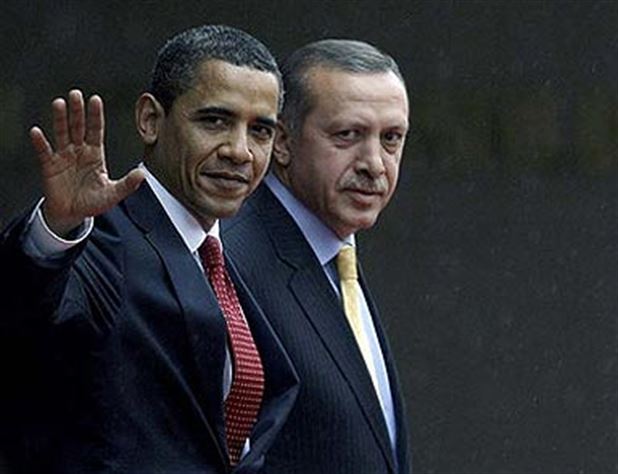The west is left leading an intervention (in Syria and Iraq) that lacks a clearly defined political ambition and a military exit strategy, The Financial Times said about the US-led coalition against ISIL.
The west is left leading an intervention (in Syria and Iraq) that lacks a clearly defined political ambition and a military exit strategy, The Financial Times said about the US-led coalition aimed at fighting the Takfiri group operating in Iraq and Syria, ISIL.
In a report published on Thursday, the writer, Philip Stephens started his article talking about Turkey whose government, according to him is “tortured by its paranoia.”
Ankara turned eastward, after being slighted by a Europe set on locking it out of the EU, Stephens said, adding that Turkey then proclaimed its place as the Middle East’s pivotal power.
 However, the strategy of Zero problems with neighbors turned into problems with all neighbors, the writer said, referring to tensions between Turkey and Syria over the current crisis, and to tensions with Saudi Arabia over the latest events in Egypt.
However, the strategy of Zero problems with neighbors turned into problems with all neighbors, the writer said, referring to tensions between Turkey and Syria over the current crisis, and to tensions with Saudi Arabia over the latest events in Egypt.
“The government, you hear it whispered, is tortured by its paranoia. The protests last year in Istanbul’s Gezi Park have been followed by a tightening of the screw over the media and business. Kemal Ataturk’s secular state looks less secular day by day. In a region torn by confessional conflict between Sunni and Shia, Mr Erdogan sounds more and more the Sunni supremacist,” the report said.
“There was nothing much wrong with the original foreign policy ambition, even if it sometimes carried a nostalgic whiff of the Ottoman Caliphate. Nor, beyond a certain hubris, was it a crazy idea that Turkey’s settlement between democracy and Islam could serve as a template for pluralist politics elsewhere. Mr Erdogan, though, bet the bank on the fall of Bashar al-Assad in Syria and the success in Egypt of the Muslim Brotherhood. He lost to a civil war and a military coup.”
The writer meanwhile said that the penning of Turkey’s border to the flow of Syria militants has helped “turn large tracts of territory in Syria and Iraq into the nightmare” which is ISIL.
In Ankara’s eagerness to topple the Syrian government, it did little to discriminate between the “good guys” of the so-called “moderate” Syria opposition and the extremists, Stephens said.
“Even now, after they have signed up to the US-led coalition against (ISIL), the Turks are conflicted. The government worries about the export of Isis terrorism to Istanbul. More importantly, it wants to avoid making a choice between defeating (ISIL) and removing” the Syrian government.
Such tensions are not uniquely Turkish, the writer went on to say, adding that like “glorious Istanbul”, everyone in the region is “looking in two directions.”
“Saudi aircraft are flying sorties against ISIL fighters, but Saudi Arabia remains the principal source of the fundamentalist theology that is the foundation stone for the jihadis. If Riyadh agrees that things have got out of hand, it does not want to disempower the Sunni chiefs who have provided support for the jihadi self-proclaimed caliphate.”
“To a greater or lesser degree the wealthy Gulf states display the same ambivalence: ISIL should be checked, but not at the expense of handing victory” to Iran.
“Here lies the fatal flaw in the west’s promise to destroy ISIL. In military terms, it does not look an absurd proposition. For all their looted cash and military kit the 20,000 or so fighters occupy a landlocked space surrounded by hostile forces. Destroying, ISIL, however, demands more than western air strikes or, for that matter, boots on the ground. It requires a single-minded political as well as a military commitment on the part of the regional powers to a post-ISIL settlement,” the report added.
“For Turkey and Saudi Arabia regime change in Damascus and settling scores with Iran take precedence over any such accommodation between Shia and Sunni. Yet the moderate Syrian opposition ready to replace Mr Assad is a threadbare fiction.”
“The west is left leading an intervention that lacks a clearly defined political ambition and a military exit strategy. Stemming the jihadi tide to prevent the collapse of Iraq was one thing; waging an open-ended war against Sunni extremists in Syria quite another.”
“It is easy to see why Barack Obama embarked on the project with such deep reluctance. The lesson for the US president from the wars in Iraq and Afghanistan has been that, to the extent that the west can do anything much in the Middle East, it can only be with the buy-in of regional powers.”